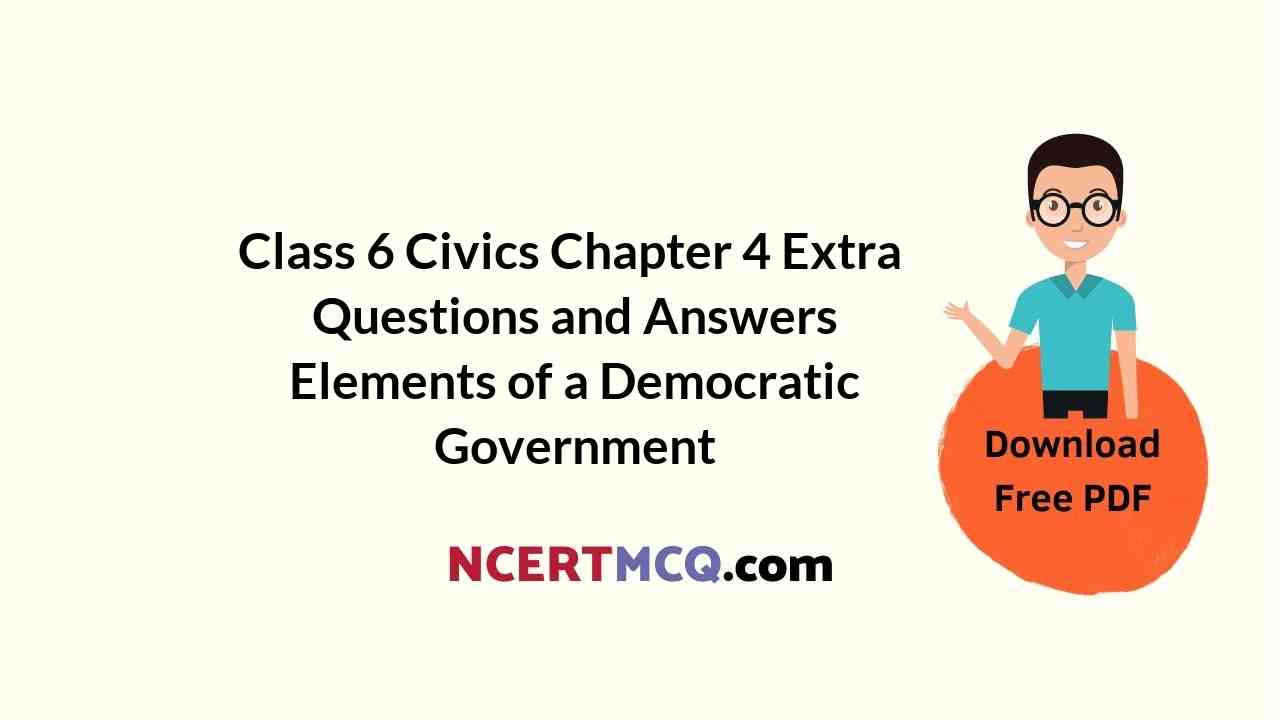Here we are providing Class 6 Civics Chapter 4 Extra Questions and Answers Elements of a Democratic Government was designed by subject expert teachers. https://ncertmcq.com/extra-questions-for-class-6-social-science/
Key Elements of a Democratic Government Class 6 Extra Questions Civics Chapter 4
I. Fill in the blanks in the following sentences, either with an appropriate word or phrase.
(1) The key elements of the democratic government are ………………………….., …………………….. .
Answer:
Liberty, Equality,
(2) ………………………….. was the language that white people spoke.
Answer:
Afrikaans,
(3) ………………………….. fought apartheid in S. Africa.
Answer:
African National Congress,
(4) Zulu was the language spoken by the ………………………….. in South Africa.
Answer:
Blacks,
(5) In India the government is elected for ………………………….. years.
Answer:
five.
![]()
Class 6 Civics Chapter 4 Extra Questions And Answers Question 1.
Name the races of people in S. Africa. Why did they come here?
Answer:
South Africa is a country that has people of several races. There are black people who belong to South Africa, whites who came there to settle and Indians who came as labourers and traders.
Class 6 Civics Chapter 4 Extra Questions Question 2.
What were Apartheid laws?
Answer:
The word ‘apartheid’ means separation on the basis of race. South African people were divided into whites, blacks, Indians and coloured races. According to the law, these races were not allowed to mingle with each other, to live near each other or even to use common facilities.
Chapter 4 Civics Class 6 Extra Questions Question 3.
Write the name of one black township,
Answer:
One black township was south-western township or SOWETO.
Class 6 Civics Chapter 4 Questions And Answers Question 4.
Why was Hector Ndlovu shot by police? When did the incident take place?
Answer:
Hector Ndlovu was shot by the police because he and his classmates had joined the protest against learning the Afrikans language in school. This was the language that the white people spoke. The incident took place on 30th April 1978.
![]()
Ncert Class 6 Civics Chapter 4 Extra Questions Question 5.
Who fought against the apartheid laws? What was the result of this struggle?
Answer:
The African National Congress, a group of people who – led the struggle against apartheid. The most well-known leader of the African National Congress was Nelson Mandela, who fought the apartheid laws for several years. South Africa became a democratic country in 1994, in which people of all races were considered equal.
Class 6 Civics Chapter 4 Question Answers Question 6.
What is meant by consensus?
Answer:
Everyone has the same view regarding an issue.
Class 6 Civics Ch 4 Extra Questions Question 7.
Write about the conflict between the states of Karnataka and Tamilnadu over the issue of R. Cauvery?
Answer:
The rivers can become a source of conflict between states. A river may have its origin in one place and after flowing through many states that finally end its journey in the sea or ocean. The sharing of river water between different places that the river goes through is becoming an issue. There is a dispute between Karnataka and Tamilnadu over the sharing of the Cauvery water. The water stored in Krishnasagar dam in Karnataka is used for irrigation in several districts and for meeting the needs of various cities.
The water stored in Mettur dam of Tamilnadu is used for crops grown in the delta region of that state. A conflict arises because dams are on the same river. The downstream dam in Tamilnadu can only be filled up with water when it is released from the upstream one located in Karnataka. So both the states cannot get as much water as they need for people in their states. This leads to conflict. The central government has to see that, fair distribution is worked out.
![]()
Multiple Choice Questions
1. Which one of the following refers to apartheid laws?
(a) The laws which brings separation in the country on the basis of race :
(b) The laws which brings separation in the country on the basis of castes
(c) The laws related to marriage
(d) The laws related to property disputes
Answer:
(a) The laws which brings separation in the country on the basis of race.
2. In which races were the African people divided?
(a) The black and the Indians
(b) The black and the coloured
(c) The white, the black, the Indians and the coloured
(d) The red and the black.
Answer:
(c) The white, the black, the Indians and the coloured.
![]()
3. The African National Congress is a group of people who led the struggle against:
(a) Muslim community
(b) the black
(c) the Indians
(d) apartheid.
Answer:
(d) apartheid.
4. Who is Nelson Mandela?
(а) The leader of the African National Congress
(b) A religious scholar
(c) A famous poet
(d) Both (b) and (c).
Answer:
(а) The leader of the African National Congress.
5. When did South Africa become a democratic country?
(a) In 1984
(b) In 1994
(c) In 1999
(d) In 2005.
Answer:
(b) In 1994.
![]()
6. For how many years is the government elected in India?
(a) 5 years
(b) 6 years
(c) 4 years
(d) 10 years
Answer:
(a) 5 years
7. Which of the following are the ways in which people express their views and make governments understand what actions they should take?
(а) Thomas
(b) Strikes
(c) Signature campaigns
(d) All the above.
Answer:
(d) All the above.
8. How do members of the minority community, Dalits, Adivasis, women and others participate in the government?
(a) By educating themselves
(b) By making themselves rich
(c) Organising themselves into social movements
(d) By making prayers to the government
Answer:
(c) Organising themselves into social movements.
